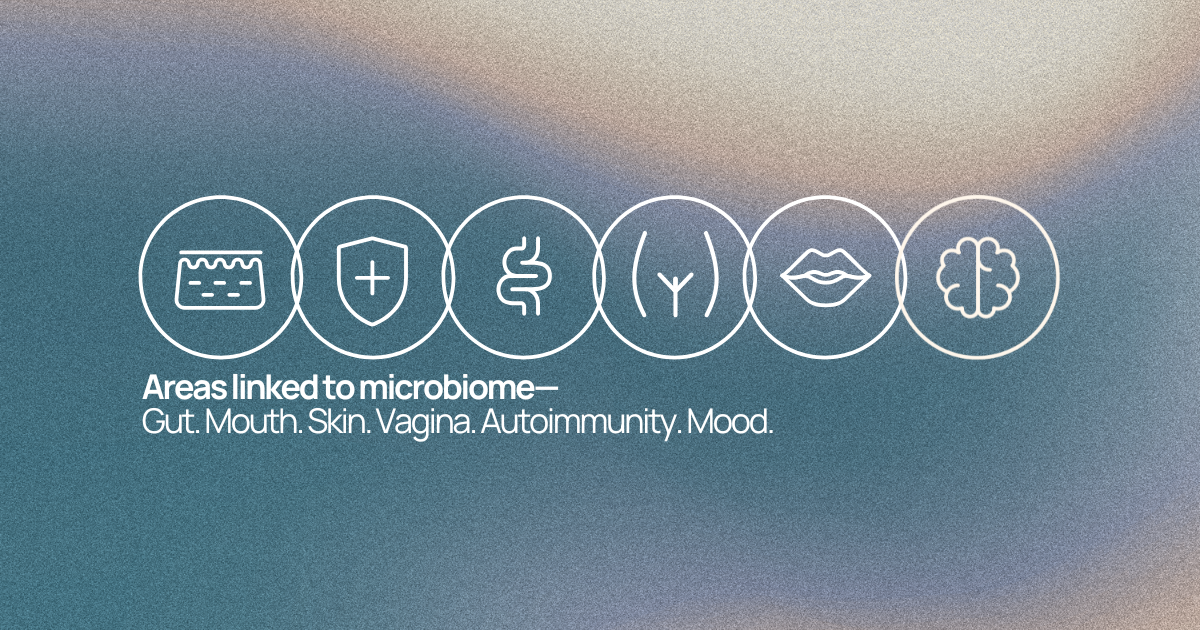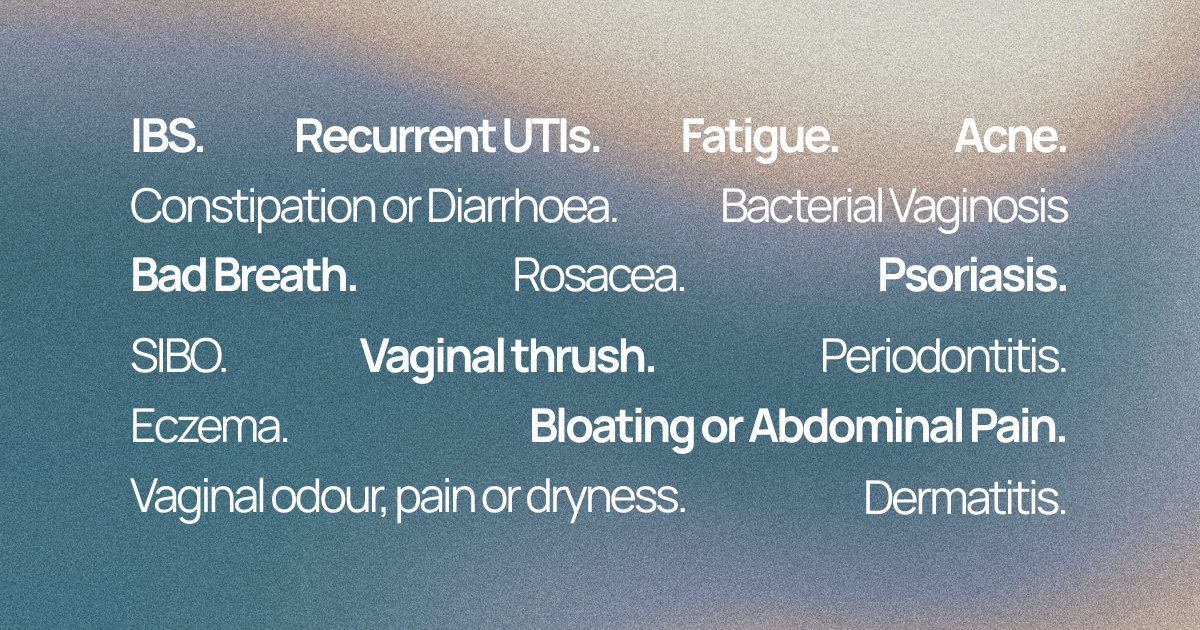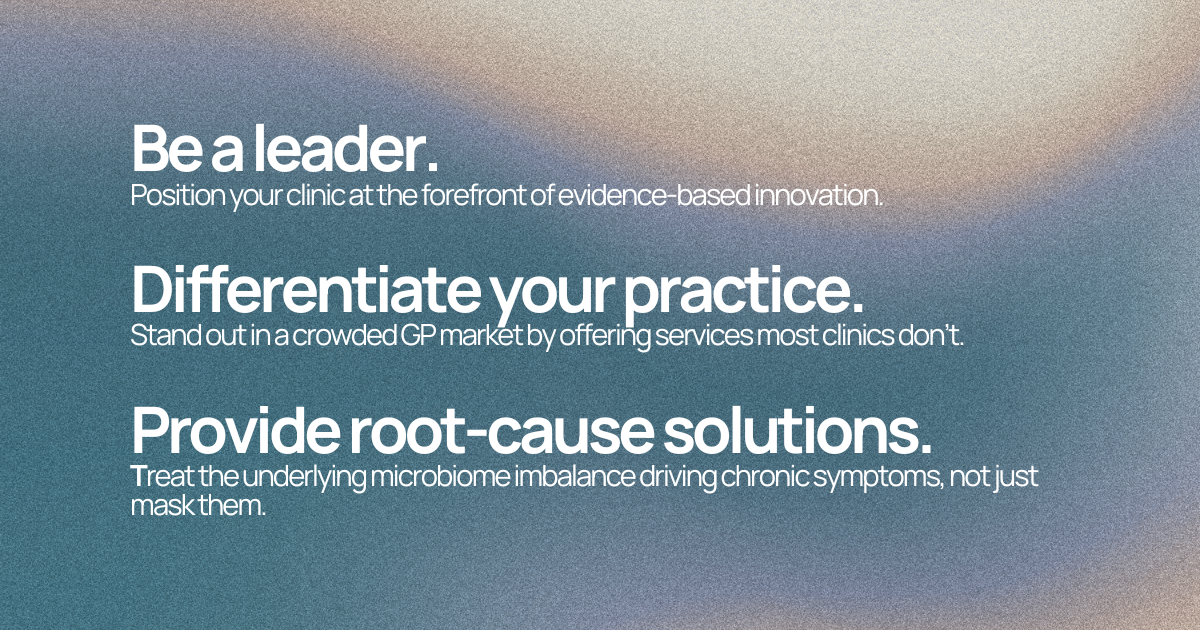Bring Microbiome Medicine Into Your Clinic
How Can I Manage the Microbiome as a Doctor?
The Role of the Microbiome
The human microbiome influences far more than digestion alone. Research shows clear links between the gut and the brain, skin, vagina, and oral cavity. Yet these connections are rarely discussed in mainstream medicine—leaving many patients with symptoms untreated at their root cause.

What You Can Treat
Microbiome-focused care goes beyond symptom management—it addresses the underlying dysbiosis driving common conditions seen in everyday practice. With structured microbiome testing and treatment programs, GPs can support patients struggling with IBS, bloating, constipation, diarrhoea, reflux, recurrent UTIs, bacterial vaginosis, thrush, acne, rosacea, eczema, gum disease, bad breath, and even mood-related disorders linked to the gut-brain axis. These are conditions patients are desperate to solve—and now you can offer them evidence-based, doctor-led solutions.

The Opportunity for Your Practice
Patients are searching for answers that traditional care often overlooks. IBS, recurrent UTIs, acne, oral disease, mental health concerns—so many of these have a microbiome root cause. By introducing microbiome testing and structured treatment programs, you can provide a science-backed, doctor-led solution that not only improves patient outcomes but also differentiates your clinic in a crowded market.




What You'll Receive as a Doctor
Implementation requires more than just education — Dr. Froomes has developed easy-to-follow Microbiome Repair Programs with specific testing, supplement and antibiotic protocols to manage your patients.
Education Session with Dr. Froomes
This includes an initial education session for you and other interested colleagues — In-Person in Melbourne or online Australia-wide.
Easy-to-implement Patient Programs
We provide you with resources, microbiome testing and microbiome repair programs to make treatment simple for you and your patients.
Ongoing GP Support
Our support team are always available to answer any questions you have — Research, Program or Patient-related. For complex cases, Dr. Paul Froomes is available for support.
Materials for your Clinic
We provide you with physical or digital program guides and referral pads to ensure you and your patients can be effectively and seamlessly treated
Microbiome Education & Support is Entirely FREE.

Are you interested in learning more?
Contact form
Required fields are marked with *.
Start with Dr. Paul Froomes' Education Course
See details below
What's Inside the Course?
Explore the interconnected nature of the gut and society, how entrenched it is in our psyche, the historical acknowledgement of the importance of gut health ("All disease begins in the gut" - Hippocrates). Learn about the body's most important organ and is bacterial components.
Empowers medical professionals and practitioners to understand The Microbiome and implement effective strategies in your own practice to heal IBS and other gut-related issues.
Learn to identify and diagnose dysbiosis (bacterial imbalance), a key disruptor of gut health. This module provides practical diagnostic approaches, including interpreting key biomarkers and symptoms. It focusses on the link between dysbiosis and IBS.
Empowering healthcare workers in treating SIBO/IBS patients and patients presenting with gastro-intestinal symptoms. Learn how antibiotics, a low-FODMAP diet, plant extracts, and more seek to correct Bacterial Overgrowth.
Learn and understand the interrelationship between the emerging and poorly understood terms "prebiotics", "probiotics", "digestive enzymes". This module instructs you as to how you can implement these practices within your clinic.
Discover the connection between gut permeability (leaky gut) and its effects on the brain and overall health. This module dives into the gut-brain axis, providing insights into how gut health influences mental health and chronic illnesses. Learn actionable strategies to address leaky gut and its downstream effects.
Explore the causes of "Leaky Gut" and discover why intestinal permeability can lead to autoimmune disease. See the effect of carbohydrate consumption on The Intestinal Wall and how to avoid intestinal wall damage in a world that makes it difficult.
Receive instruction illustrating the process from diagnosing to treating patients who present with IBS/SIBO or any other GI symptoms. Further your education with our additional resources.
Why Choose Our Course?
Stay at the Forefront of Microbiome Research
This course equips you with the latest insights into the microbiome and its profound impact on health. As research evolves rapidly in this field, staying updated ensures you provide cutting-edge care to your patients.
Earn CME Points
You’ll learn actionable strategies for diagnosing and managing microbiome-related conditions, including IBS and other chronic gut illnesses. The course focuses on real-world applications, enabling you to seamlessly integrate these skills into your clinical practice.
Gain Practical, Patient-Centric Skills
By completing this course, you not only enhance your knowledge but also earn valuable Continuing Medical Education (CME) points. This supports your professional accreditation and showcases your expertise to patients and peers.
Learn from a Renowned Expert
Designed by Dr. Paul Froomes, a leading gastroenterologist in the microbiome field, this course offers exclusive access to his expertise, including a one-on-one post-course consultation to address specific clinical challenges or queries.

Meet Dr. Paul Froomes — The Visionary Behind the Microbiome Education Course
With over 30 years of clinical experience, Dr. Paul Froomes is a leading authority in the microbiome field. His groundbreaking work combines state-of-the-art research with proven clinical practices to revolutionize gut health management. Dr. Froomes is passionate about empowering healthcare professionals to diagnose and treat gut-related conditions effectively, ensuring better patient outcomes.
Got Questions About the Course?
Contact form
Required fields are marked with *.
